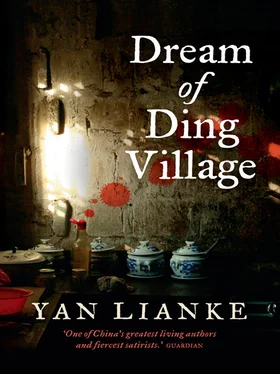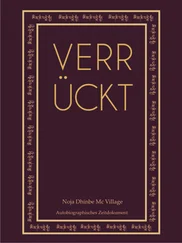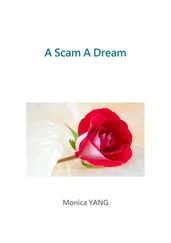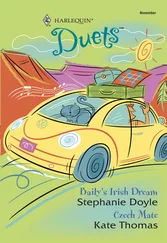The more water he took, the more it flowed. It was just like the director had said.
Grandpa threw down the bowl on the sand and dusted off his hands.
‘Did you see that?’ he asked, glancing around at the villagers. ‘Water never runs dry. The more you take, the more it flows.’
He raised his voice. ‘It’s the same with blood. Blood always replenishes itself. The more you take, the more it flows.’
Grandpa shifted his gaze to the county director. ‘They’re waiting for me at the school,’ he explained. ‘If I’m not there to ring the bell, the kids won’t know when class is over.’
The director, who couldn’t care less whether or not the students knew when to leave class, looked first at Grandpa and then at the villagers. ‘Do you understand now?’ he barked. ‘Water never runs dry, and you can never sell too much blood. Blood is like spring water. That’s just basic science.
‘You can get rich or stay poor,’ the director continued, kicking at the bowl lying in the sand. ‘It’s up to you. You can travel the golden road to wealth and prosperity, or you can stay on the same dirt path and live like paupers. Ding Village is the poorest village in the province. You haven’t got two coins to rub together. Rich or poor, it’s your decision. Go home and think about that.’
‘Think it over,’ he continued. ‘Other places in the province are selling blood like crazy. In other villages, they’re putting up rows of multi-storey buildings. But decades after liberation, after decades of socialism and Communist Party leadership, all Ding Village has to show for itself is a bunch of thatched huts.’
When the director had said his piece, he left. So did Grandpa.
The villagers dispersed, each to their homes. They had a lot to think about.
Rich or poor, it was their decision.
As dusk fell, a bleak chill settled over the dry riverbed. Rays of setting sun washed over the sandy soil, leaving pools of red and russet, patches like congealed blood. The fresh green smell of vegetation wafted in from distant fields of wheat and flowed across the sand like water, leaving invisible ripples on the shore.
My father, who had stayed behind after the others had left, lingered on the riverbed beside the hole that Grandpa had dug. He stared into that hole for a very long time. Finally he bent down, cupped his hands and began to drink the water, splashing it on his face and laughing.
He plunged his hands into the hole and started to dig, transforming the half-dry pit into a living spring. Water gurgled up past the rim of the hole and overflowed onto the dry sand. A broken chopstick, caught up in the eddy, was carried away like a willow twig.
My twenty-three-year-old father sat back on his heels and laughed.
2
It was after midnight when Grandpa went to bed. Images of blood-selling filled his dreams. He saw plainly the course of the fever: its causes and effects. He felt the pulse and flow of the blood-selling business and blood-wealth. Cause and effect were clear: what you plant in spring, you harvest in the autumn. You reap what you sow.
Grandpa slept in a squat, two-room brick building next to the school gate. The only furnishings in the inner room were a bed and desk. The outer room contained a simple stove, stools, bowls and chopsticks, a basin and a chopping block. If there was one thing Grandpa knew, it was the importance of keeping those two rooms shipshape. Each night before bedtime, he stacked stools against the wall, arranged bowls and chopsticks on the chopping block and stowed pails of drinking water beneath the stove. In the inner room, he swept up bits of broken chalk and placed them in a box on the top-right-hand corner of the desk. He gathered piles of old textbooks and homework notebooks and stacked them in desk drawers. If Grandpa could keep his house in order, with a place for everything and everything in its place, then he could keep his dreams neat and orderly as well. And in the morning, when the sun rose and Grandpa opened his eyes, the dreams of the night before would stay with him, as vividly real as stalks of wheat in a field or beans upon a vine. Not a word forgotten, not a detail lost.
Each night before bedtime, Grandpa put his house in order. And, each night, his dreams were as neat and orderly as the homework of a diligent student.
In his dreams, he saw so clearly the events that had led to the blood-selling.
In his dreams, he finally understood.
With a clanging of hammers, they drove in the stakes of Ding Village’s first blood-collection station, a dark-green canvas tent that sprang from the soil like a fresh green turnip. Red lettering on a wooden signpost outside the tent identified it as the County Hospital Blood Bank. But on the first day, not a single villager came to sell blood. It was the same on the second day. On the third day, the county Director of Education showed up at the gate of the school in his Jeep. He had a few things to say to Grandpa.
‘Professor Ding, the county governor is going to fire me if I don’t get this blood station up and running. What do you suggest we do?
‘I’m not trying to put you in an awkward position, Professor Ding. Tomorrow I’ve arranged for trucks to take some people from Ding Village on a tour of Cai county. It is the richest county in Henan; a model for the whole province. All I need you to do is recruit one person from each household to join the tour.
‘In addition to giving each person a travel subsidy of ten yuan per day, we’ll also be passing through the provincial capital, so everyone will have the chance to see the sights and do some shopping.
‘I’m sorry, Professor, but if you don’t help me organize this trip, you needn’t bother ringing the bell at this school any more, because Ding Village won’t have a school.’
With this, the Director of Education climbed back into his Jeep and set off for the next village on his list. The vehicle sped into the distance, the engine purring softly, unlike the noisy tractors that rumbled across the plain. Grandpa stood at the school gate and gazed at the clouds of exhaust that the Jeep left in its wake. His face had turned pale. He had always heard that Cai county, located in another region of Henan, was destitute. How on earth had it become a model of wealth for the entire province?
After the county director breezed out of the village, Grandpa had no choice but to go door to door and try to recruit one member of each household to gather bright and early at the village marketplace and wait for the trucks that would take them to Cai county.
‘Does everyone really get ten yuan per day?’ the villagers asked.
‘That’s what the director said,’ answered Grandpa. ‘And he’s as good as his word.’
‘And on the way home, do we really get to tour the capital?’
‘If that’s what the director said,’ sighed Grandpa, ‘I’m sure he’s as good as his word.’
So it was that people and events were set in motion. The trip seeded the way for the people of Ding Village to begin selling their blood, as farmers fertilize their fields each spring in preparation for the autumn harvest. Whenever Grandpa saw that tour of Cai county in his dreams, his eyes would fill with tears and he would toss and turn in bed and sigh.
Cai county was more than 100 miles from Ding Village. Although the villagers had made an early start, it was nearly noon by the time they reached their destination, Cottonwood Village. Crossing the county line was like driving into some sort of paradise. The villagers were startled to see both sides of the main road lined by modern, two-storey homes of red brick and tile. The rows of houses were as neat and symmetrical as if someone had drawn them on paper with a ruler. There were flowers in every doorway, trees in every courtyard and broad avenues of poured concrete. On the outer wall of each house hung a square, red-bordered plaque with three, four or five shiny gold stars. The five-star plaques were reserved for those who had excelled at selling blood, the so-called ‘Five-Star Outstanding Blood Donor Households’. The four-star plaques were given to the runners-up, and the three-star plaques to households whose blood contributions had been average.
Читать дальше












